Minerals
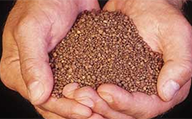
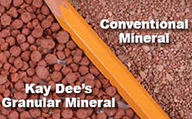
KAY DEE WEATHERIZED GRANULAR MINERAL
Kay Dee's granular mineral is second-to-none. The unique manufacturing process has been refined through the years to produce a nutrient-rich granule, making it superior to conventional loose mineral. Free-flowing granules resist caking and remain fresh in bags and feeders. Our weatherized mineral line is similar to Super Ranger Kaydets in shape and texture, yet does not offer a mineral package as complete as those found in Super Ranger Kaydets.
- Weatherized granules resist caking and weathering
- Unique shape and texture ensure product will not blow away
- Consistent consumption from highly palatable aroma and texture
- Cost pennies per head per day
- Contain a balanced formulation of minerals, chelated trace minerals, and vitamins
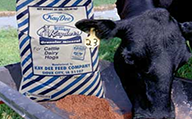
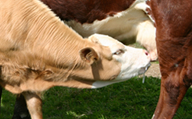
CALVING, LACTATING & REBREEDING
SUPPLEMENT DURING THIS CRUCIAL PHASE OF PRODUCTION
The nutrient demand of a calving, lactating and rebreeding cow is 40% higher than a dry cow. The challenge of every cow-calf producer is to feed rations that satisfy this increased demand 30 to 60 days before calving to produce a healthy calf. Complete calving mineral supplements are important not only for their benefit to the calf, but should also be fed to the cow through rebreeding for optimal rebreeding results.
Dry forages fall well short of supplying the daily recommended levels of minerals, trace minerals and vitamins required by a brooding cow. Volumes of university research and field testing show that supplementing rations with a quality mineral supplement may:
- Produce heavier calves at weaning
- Maintain body condition during the stress of pregnancy
- Support milk production
- Support conception rates
- Support the immune system of newborn calves
- Ease with clean-out & rebreeding
Several of Kay Dee's Super Ranger Kaydets Granular Mineral are formulated for the special needs of the calving, lactating, and rebreeding phases of production. Kay Dee also offers a mineral block specific for calving, lactating, and rebreeding. All of these solutions are balanced formulations of minerals, trace minerals, and vitamins designed to satisfy the special nutrient needs of calving, lactating and rebreeding cows.
- High levels of copper and zinc support a strong immune system in the cow and her calf
- Balanced calcium-to-phosphorus ratios improve phosphorus utilization
- High levels of important organic trace minerals prevent deficiencies
- High levels of vitamins A, D & E support calving and conception rates
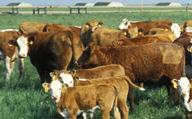
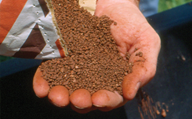
PASTURE/MAINTENANCE
YEAR-ROUND SUPPLEMENTATION CAN IMPROVE YOUR BOTTOM LINE
Generally, most rations are deficient of one or more minerals at different times throughout the year. To benefit from the full nutritional value of any one mineral, adequate quantities of all other minerals must be available. Because of this, it is ideal to provide a complete mineral supplement year-round.
A complete mineral supplement not only supplies phosphorus and calcium, but also provides a total package of other important minerals, trace minerals, and vitamins formulated in exact amounts for maximum utilization by the animal. Salt blocks or trace mineral salt blocks contain little nutrient value, making them ineffective as a mineral supplement, even during maintenance only periods. Profit requires maximum-producing livestock and maximum production is dependent on daily diets that provide required levels of all necessary nutrients, including minerals, trace minerals, and vitamins.
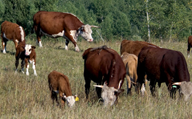
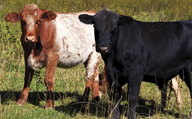
FESCUE
DON'T LET FESCUE FEEDING AFFECT YOUR BOTTOM LINE
Tall fescue is the most common type of pasture forage in the U.S. due to its drought resistance, cool-season hardiness, nutrition quality, and performance in poor soil conditions. Depending on different levels of rainfall and soil content, the quality of tall fescue can be dramatically reduced by the introduction of “fescue fungus,” or endophyte-infected seed heads on mature fescue plants.
The fungus is not visible to the human eye but over 90% of tall fescue pastures in the U.S. are infected. Areas with lower than average rainfall have higher percentages of infected seed heads. Therefore, the fungus predominantly affects regions in the southern U.S., and can give grazing cattle what is commonly called “summer slump.” Cattle consuming endophyte-infected fescue grasses may exhibit:
- Reduced conception rates
- Lower milk production
- Reduced weight gains
- Lower feed intake
- Elevated body temperatures
- Loss of ear and tail tips
- Rough & unhealthy hair coat
Providing the proper supplements, vitamins, and minerals will prepare animals for “summer slump” by boosting their immune systems, supporting proper rumen function, controlling toxins, and increasing conception rates. Kay Dee Fescue mineral products are specifically formulated to increase performance in cattle grazing tall fescue grasses. Kay Dee Fescue Mineral products contain:
- Elevated levels of Vitamin E, which are highly bioavailable and boost the immune, respiratory, and digestive systems
- Mineral clays that target endophytes, believed to lower the number of toxins
- MOS (Mannan oligosaccharides) a complex carbohydrate derived from a select strain of yeast that assists in maintaining beef cattle performance and supporting rumen health
MOS-fed cattle have been shown to maintain optimal growth, even under stressful conditions. MOS may prevent certain pathogens from attaching to the gut wall. Producers should start using Kay Dee Fescue mineral products in the early summer months and use as long as the cattle are grazing tall fescue grass whether in pastures or on hay.
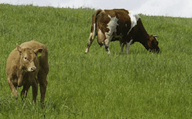
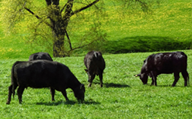
GRASS TETANY
DON'T LET A MAGNESIUM DEFICIENCY AFFECT YOUR HERD
Grass tetany is a deficiency of magnesium in the blood. It is most common among lactating cows grazing on early spring grasses. Grass tetany can lower weight gain, reduce milk production, and decrease weaning weights.
Most causes of grass tetany occur in the spring when grass is young and lush. Availability of magnesium is reduced in early grass due to the accumulation of ammonium, which interferes with magnesium absorption. Absorption of magnesium is further reduced when greater amounts of ammonia are released in the rumen following rapid ingestions of large quantities of lush green pasture
Common symptoms of grass tetany are solo grazing away from the herd, irritability, muscular twitching in the flank, wide-eyed staring, muscular incoordination, goose stepping, staggering,collapsing, head in the back position, thrashing, coma, and death.
Cattle grazing on lush, early spring grasses should be fed supplemental magnesium. Feeding should start at least one month prior to tetany season.
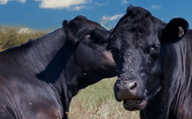
FLY CONTROL
CONTROL FLIES BEFORE THEY DIMINISH YOUR PROFITS
Flies can be more than a nuisance — they can literally kill profits. It is estimated that the beef cow industry in North America loses one billion dollars in profit each year due to flies. Kay Dee offers several minerals with fly control products. When fed at recommended rates, you'll see a dramatic reduction in fly populations and an overall improvement in animal health.
Controlling horn flies will have a positive economic impact on your herd. Control Flies with Kay Dee Altosid® IGR Products!
Some Kay Dee mineral products contain:
- Altosid® IGR: an Insect Growth Regulator (IGR) that passes through the animal and into the manure, where horn flies lay their eggs. It breaks the horn fly life cycle by preventing pupae from developing into biting adult flies. The active ingredient in Altosid IGR is (S)-Methoprene, a copy of the horn fly’s own biochemicals. (S)-Methoprene even controls horn flies resistant to the organophosphates and pyrethroids commonly used in conventional horn fly control products. In more than 25 years of use, there have been no known cases of flies being resistant to (S)-Methoprene. Altosid IGR is a convenient way to control horn flies in beef and dairy cattle.
- Rabon®: An oral feed through larvicide that kills fly larvae of all four fly species – horn flies, face flies, house flies, and stable flies. Rabon does not cause any insect resistance issues after prolonged feeding and remains active for up to six weeks. Rabon is EPA approved for beef cattle, lactating dairy cows, horses and swine. Rabon has no environmental issues and does not harm soil, water, plants, or beneficial insects such as dung beetles.


